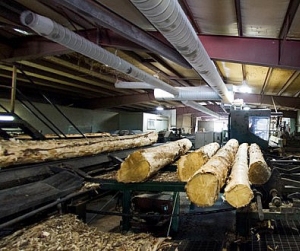
FPAC President Forewarns Members of Parliament of Vital Role Sawmills Play in Canada's Supply Chain "Our sawmills are our industry's heartbeat. We need to find a way now to keep our sawmills operating so chips can continue to feed our pulp and paper mills. If we don't have chips flowing, our industry's biggest artery is cut off." – Derek Nighbor, President and CEO, FPAC.
"Our sawmills are our industry's heartbeat. We need to find a way now to keep our sawmills operating so chips can continue to feed our pulp and paper mills. If we don't have chips flowing, our industry's biggest artery is cut off." – Derek Nighbor, President and CEO, FPAC.
April 20, 2020 - Forest Products Association of Canada (FPAC) President and CEO, Derek Nighbor, appeared before the House of Commons Standing Committee on Finance to share with MPs how Canada's forest sector and workers are managing through the current COVID-19 crisis. He also presented to the Committee ideas on how the industry and government can work together to get through the difficult months ahead, and quickly turn to recovery and growth again in 2021. During his testimony, Nighbor noted how the sector has embraced its role as an essential provider of health, household, and industrial products and thanked all workers along the value chain. "Our workers and partners along the supply chain have been incredible. We can't say 'thank you' enough to our mill workers, further manufacturers, truck drivers, railroaders, and retailers — I could go on," he said. Nighbor went on to speak to the power of our shared natural resource — Canada's forests. "Given the moments of protectionism we have seen in recent weeks, I am proud that we have this sustainable and valuable natural resource right here at home so we can provide for Canadians," he added. The interconnectedness of Canada's forest sector was central to Nighbor's remarks to MPs. While lumber markets have struggled, experiencing a near 40% price drop in recent weeks, many sawmills have made the tough decision to temporarily shut down. Those closures have not only put thousands out of work, but the impacts are now being felt downstream by pulp mill workers and their communities. "We are a highly integrated sector. Our sawmills are our industry's heartbeat. We need to find a way now to keep our sawmills operating so chips can continue to feed our pulp and paper mills. If we don't have chips flowing, our industry's biggest artery is cut off - and thousands more will be out of work," Nighbor said.
The forest sector's inability to tap into the federal government's wage subsidy program in a significant way has been a source of frustration for FPAC and its members. The program's construct simply does not fit with forest sector business models.
The forest sector's inability to tap into the federal government's wage subsidy program in a significant way has been a source of frustration for FPAC and its members. The program's construct simply does not fit with forest sector business models. Nighbor recommended adjustments like government considering individual mills or segments, which would allow more operations to qualify for support, and keep more Canadian forestry workers working. He also suggested that government consider a sliding scale, so that if revenues are down by 10 or 15 percent, a company could qualify for wage supports at perhaps 50 percent, instead of 75 percent. He also stressed the need for easily accessible supports for the months ahead to help companies manage cash flow challenges. The industry is confident about the future, but needs an immediate boost to get through the next few months. "On the lumber side, our markets took a massive hit in late 2018. We have been in recovery mode since and just as we were starting to turn the corner, COVID-19 hit. We need liquidity supports now," said Nighbor. "Measures that move with speed and ease in the face of markets that are falling for the short-term. Measures that are not going to force companies to provide more security as many of our companies just do not have the flexibility to do that right now. Measures that are responsive to the realities of this crisis — and have lenders who are prepared to be more risk tolerant than our main street banks," Nighbor added. While the main discussion with MPs was about the here and now, Nighbor was clear about his optimism for the future. "Our industry is not looking for a bailout, but rather bolstered cash flow supports to keep our businesses operating through these difficult next two to three quarters. As we look to 2021 and beyond, Canada's forest products sector has the opportunity to be one of the bright lights in the Canadian recovery — especially for northern and rural communities," he concluded. Forest Products Association of CanadaFPAC provides a voice for Canada’s wood, pulp, and paper producers nationally and internationally in government, trade, and environmental affairs. For further information, visit: www.fpac.ca. SOURCE: Forest Products Association of Canada (FPAC) |